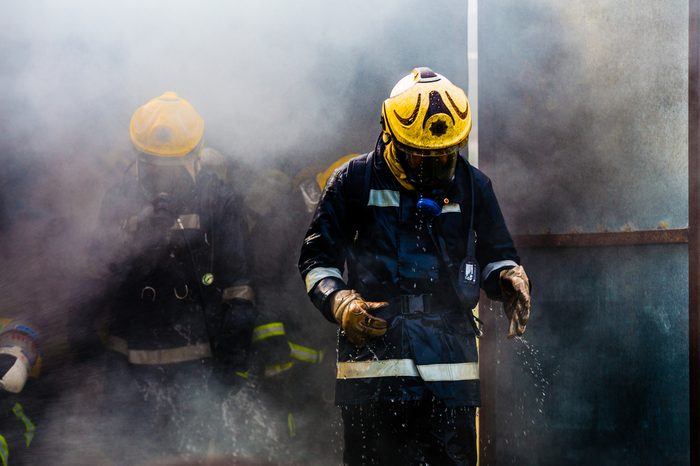
Your lives come before theirs
Firefighters put their lives in danger every day to save lives and property and to battle fires before they can spread any further. We’re “people who are willing to run towards complete chaos,” points out Pete Donahue, a Florida based firefighter who’s been fighting the deadly wildfires in California. “We’re not just trained to automatically jump when the call comes, it’s who we are.” It’s the choice they’ve made so that you don’t have to.
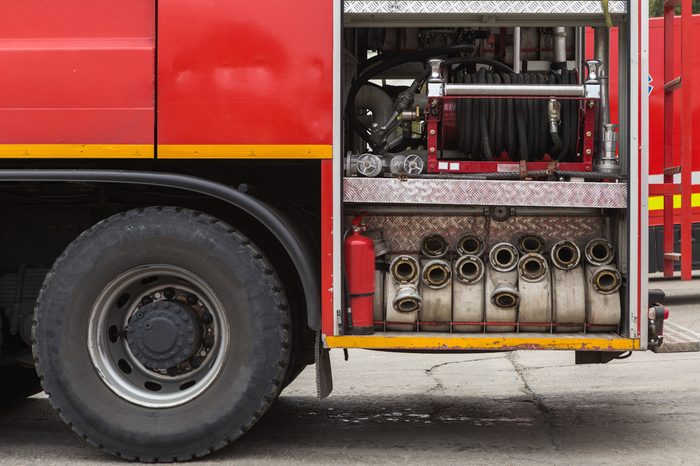
It could happen to you
“People have the mindset in many cases that fires will never happen to them. That can be a deadly assumption,” John V. Murray, the Chief Fire Safety Instructor for the Nassau County Firefighters Museum, tells Reader’s Digest. In the fire service, one of the first things new firefighters are taught is to “expect the unexpected,” and it’s not just true for firefighters. And even if you’re not in a fire, forest fires can affect the whole planet—learn some scary things that could happen if the Amazon rainforest disappeared.
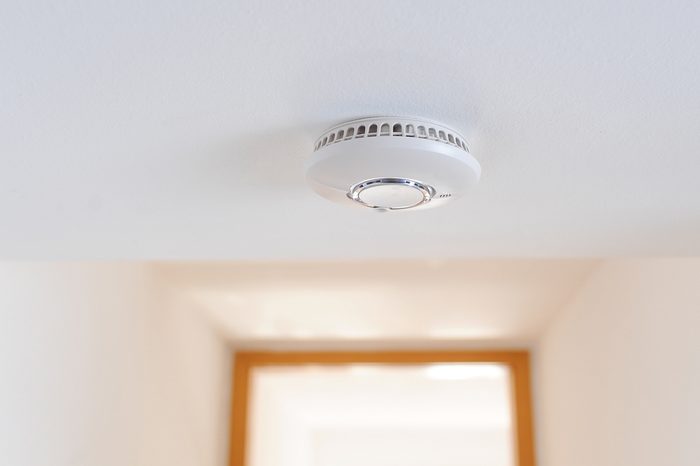
Smoke detectors save lives…
According to the National Fire Protection Association (NFPA), three out of five home fire deaths could have been prevented if there’d been a working smoke detector. Murray suggests every home have a working smoke detector on every level, outside of each bedroom, and inside each bedroom. And those detectors should come with ten-year sealed batteries, should be tested weekly, and replaced every ten years, according to fire safety expert, Sharon Cooksey, who works for fire safety products manufacturer, Kidde. Not having a smoke detector is just one of the 15 biggest home dangers.
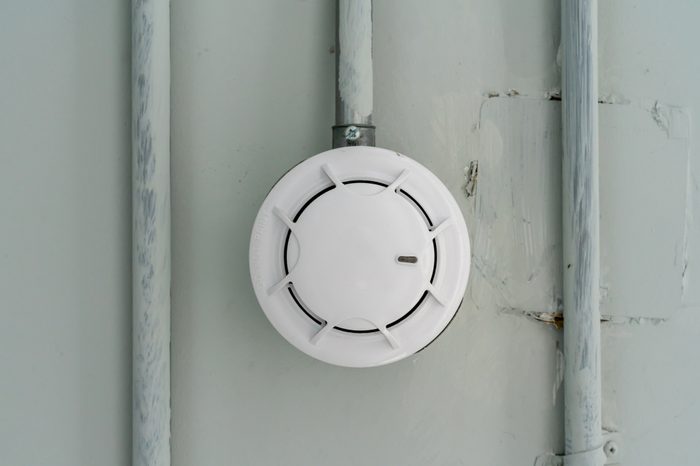
…and carbon monoxide detectors too
Just as important as smoke detectors are carbon monoxide detectors (one on each level), Murray tells us. They can save you in the event of a gas leak or a poorly vented fireplace, stove, or heating unit. Carbon monoxide can kill quickly and without any detectable odor. Such deaths are so easily prevented by CO detectors, some states require every home to have one.
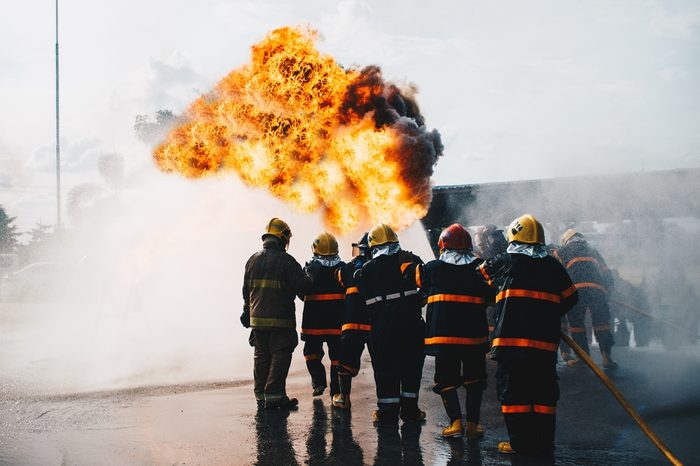
Every second counts
Of course, smoke and CO detectors are only your first line of defense; if you don’t know what to do if they sound, you’re in danger, points out Tarsila Wey, who works for fire safety product manufacturer, First Alert. What you must do is get yourself, and everyone in the house, out of the house immediately. Every second counts, Richard Stack, captain of the North Attleborough Fire Department in Massachusetts, tells Reader’s Digest. “House fires can double in size every minute that goes by.” A carbon monoxide leak can kill within 20 minutes, although it can render people unconscious and incapacitated before that. Never underestimate the bravery of firefighters–this is what it feels like to be caught in a wildfire.
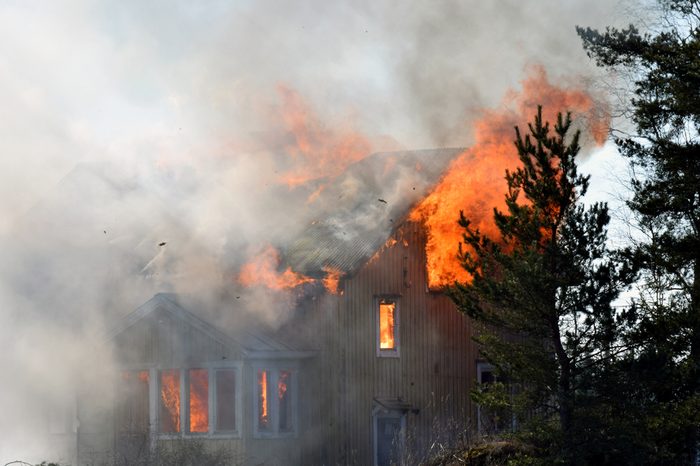
Leave your possessions behind
“Life and safety is our first priority,” Captain Stack tells us, and it should be yours as well. While your material possessions are important to you, nothing is as important as escaping to safety as quickly as possible. This is one firefighter’s account of what it’s like to let a wildfire burn over you.
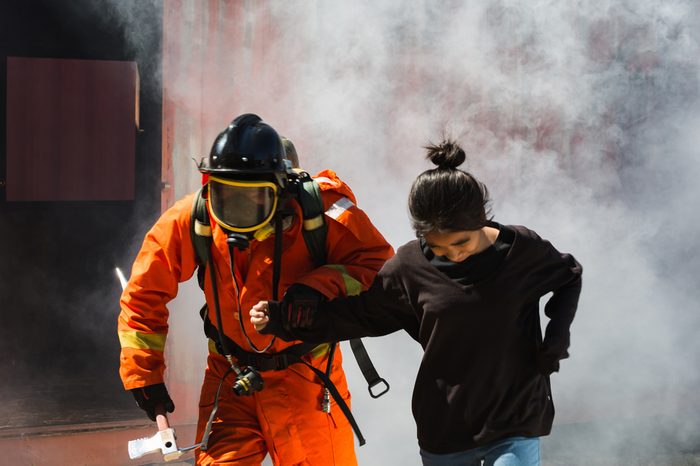
Smoke is more deadly than fire
While a fire is what seems the most terrifying, it’s smoke that is most deadly. “A single breath of toxic super-heated smoke could definitely cost you your life,” Captain Stack tells us. “Most victims of structural fires die from asphyxiation rather than coming into contact with flames.”
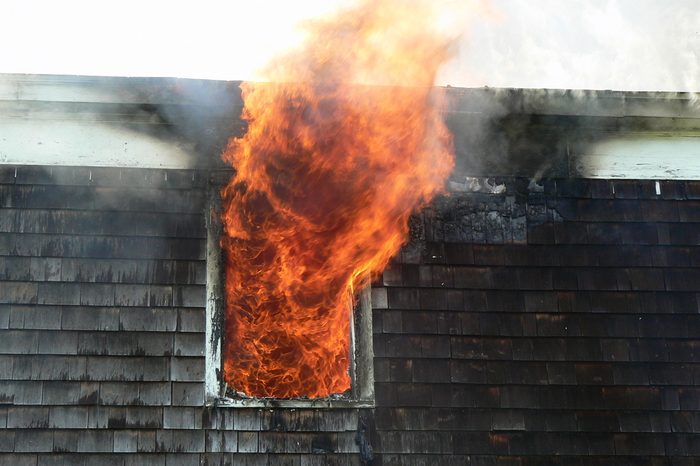
Never enter or go back into a fire
Going back into a burning building gets people killed, Captain Stack says, no bones about it. Once you’re out, stay out, and let the fire department do its job. If someone (or a pet) is trapped, please know that firefighters are trained in escape and lifesaving measures. And their aim is to arrive within three to five minutes of receiving your call. Fire stations are located where they are for precisely that purpose, Captain Stack explains, so please trust that help will be there soon. Read this firefighter’s terrifying account of what it’s like to be caught in a California wildfire.
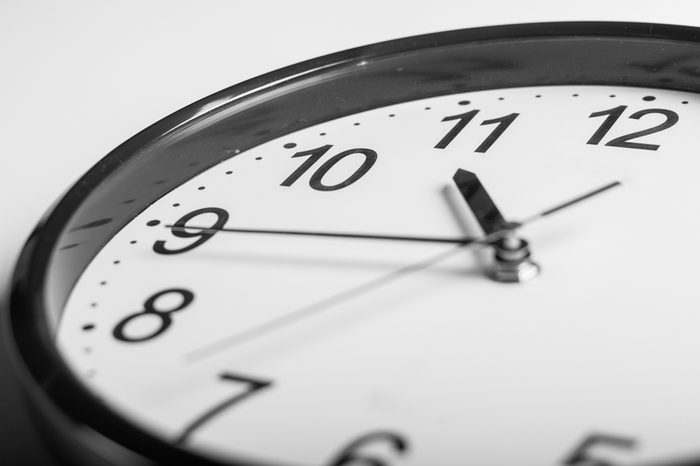
You only have one to two minutes to escape
If you were taught fire safety in school 40 years ago, you may have heard you have around 17 minutes to escape a fire. While it was true then, it’s not true anymore, according to Steve Kerber, who has more than 13 years of firefighting experience and serves as director of UL Fire Safety Research Institute (ULFSRI). That’s because construction materials, furniture, and floor plans have changed, reducing the time to more like one to two minutes, Wey says. But “remain calm,” she urges. That’s actually plenty of time to escape safely.
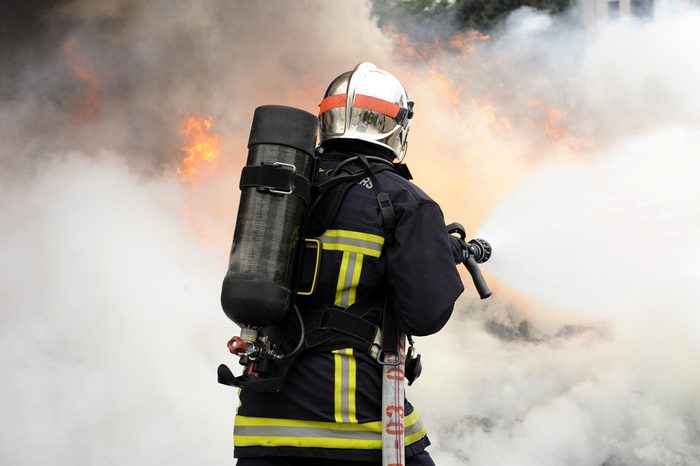
Never hide from or attempt to fight a fire
In the event of a fire, the only thing that should be on your mind is escaping. Never try to fight a fire or hid from one. It’s impossible, Murray says. Instead, escape, and then call the fire department immediately. The faster you escape and make that call, the faster firefighters will arrive. Here’s what else you should never ever do in a life-or-death emergency.
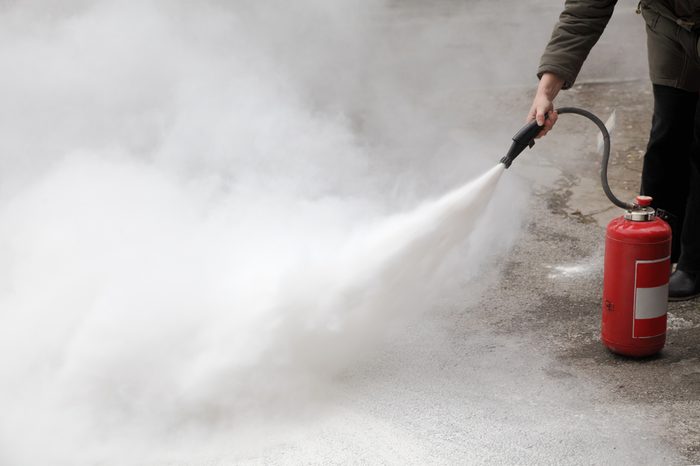
But do prevent and stop kitchen flare-ups
Most fires start in the kitchen, according to the Red Cross, so preventing and reacting quickly to kitchen flareups is crucial. Having a fire extinguisher handy in the kitchen is your best defense, according to Wey, who says it’s easy to remember how to use one if you remember, “PASS”:
P – Pull the pin
A – Aim the nozzle toward the base of the fire
S – Squeeze the trigger
S – Sweep the nozzle from side to side.
If that seems too complicated, First Alert’s Tundra Fire Extinguishing Spray is an easier-to-use alternative.
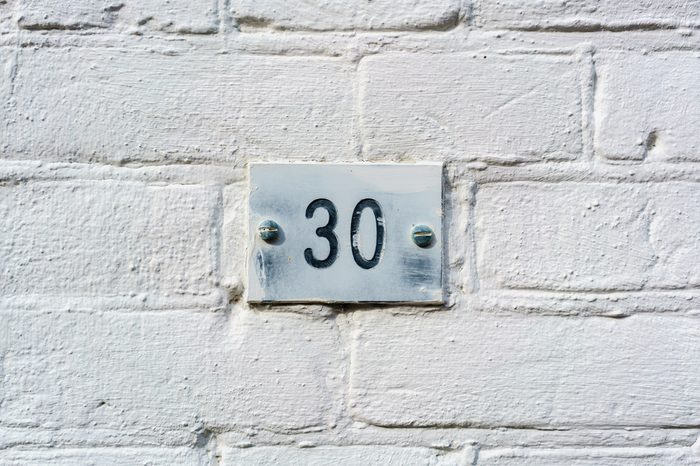
Your house number should be clearly visible
House numbers are so much more important than homeowners might think, points out Mike Gnitecki, a firefighter and paramedic with the Gladewater Fire Department in Texas. “Please make sure your house number is easily visible from the road. If you have a mailbox on the street, put your house number on that, and preferably in white lettering with a green background, which Gnitecki says is the easiest to read.
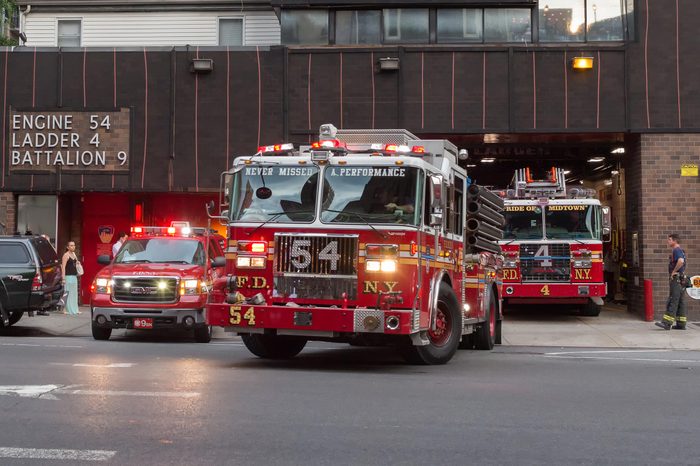
“Wave us down!”
Even if you have a clearly visible house number, another reason you want to remain outside after escaping a fire is to wave down the firetrucks. “When we arrive we don’t want to be guessing which house we are going to,” Captain Stack says. “Trust me when I say it is one of the worst feelings to think you are at the correct address and not be.”
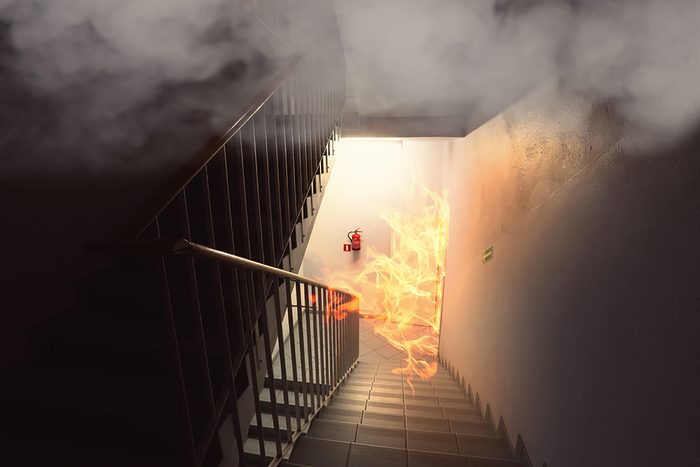
Have an escape plan and practice it!
Less than half of all households have a fire-escape plan, according to the NFPA, but having one can mean the difference between life and death. Here’s everything you need to know about creating an escape plan for your family and home fire drills.
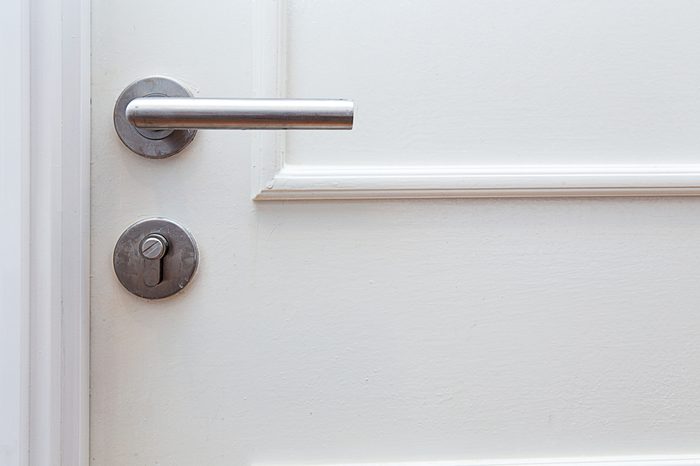
If only more people slept with their bedroom doors closed…
Fires spread more quickly the more oxygen they have, but you can slow the spread of a house fire, as well as reduce toxic smoke levels if you keep your bedroom doors closed while you’re sleeping. “Closing your door can dramatically increase your chances of survival,” according to Kerber. It’s so important, his organization (the ULFSRI) has launched Close Your Door, a mission aimed at educating the public about how “closing before dozing” can save lives by slowing the spread of fire and smoke.
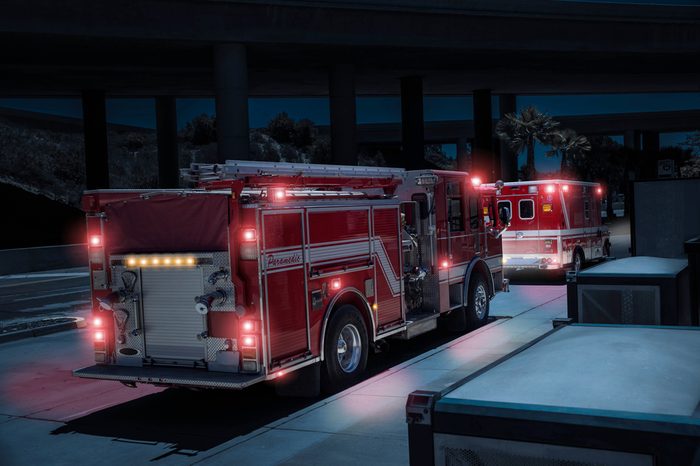
Respect sirens
Please, please, please, when you hear sirens, pull over to the right as much as possible and come to a complete stop, begs Jared Wolff, a longtime firefighter and EMT. Lots of people don’t seem to know that coming to a full stop is really helpful and can save lives. This is especially true on long, rural roads with twists and turns. This is why wildfire smoke is way more dangerous than you realized.
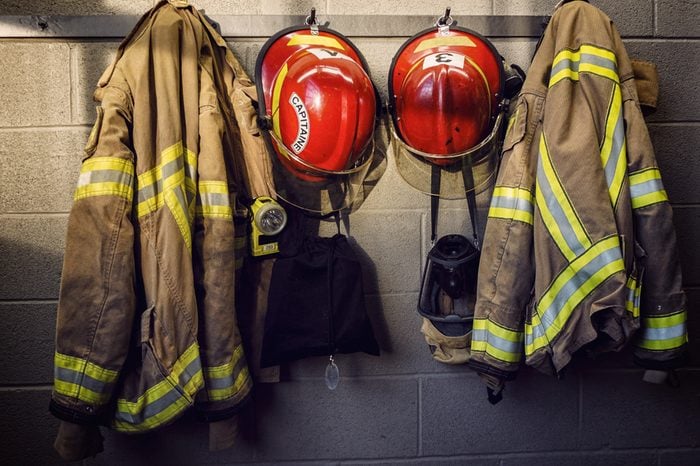
Talk reassuringly to your children about fire safety
While it’s important to talk to your kids about fire safety and what to do in the event of a fire (including NOT hiding), it’s equally important to reassure them that firefighters will help them and that they needn’t be afraid of them. “Young children can be frightened by fully geared firefighters,” Wey points out. Here’s a fun firefighter fact for your kids: firehouse dogs are usually Dalmatians.
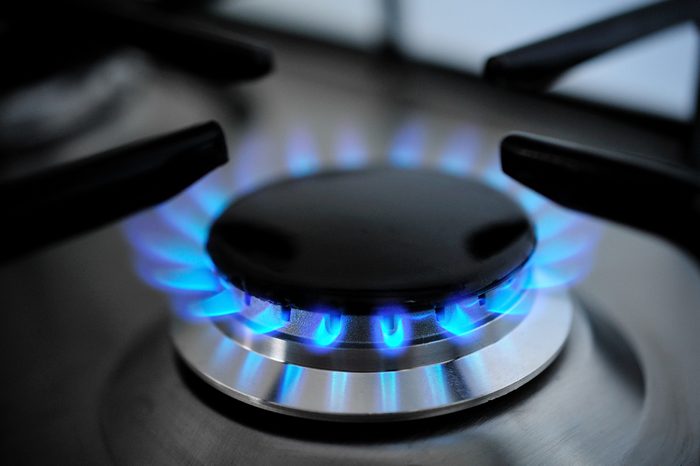
Practice prevention
Our experts tell us that the biggest cause of house fires include:
- Unattended cooking
- Unattended candles
- Faulty circuits
- Overloaded circuits
- Overloaded power strips and other incorrect use of power strips
- Children playing with matches and lighters
- Space heaters
- Burning garbage
Next, read on for the 45 things police officers want you to know.
